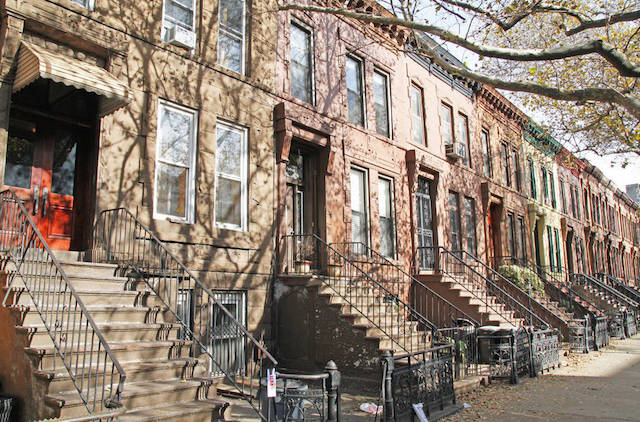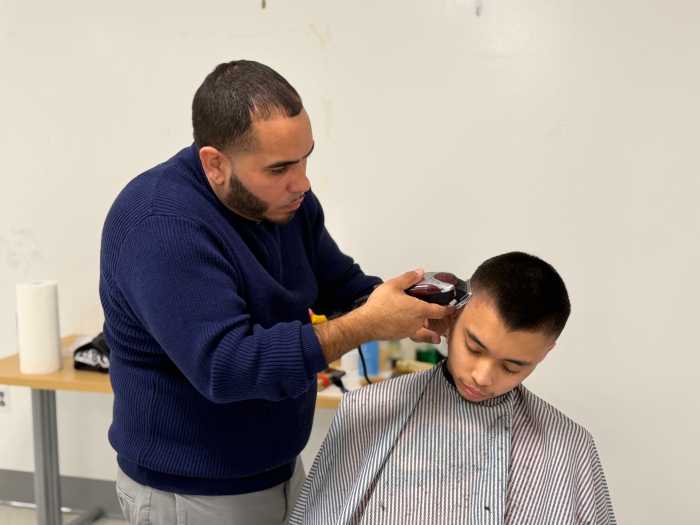Skyrocketing home prices that’s led to the gentrification of black Brooklyn neighborhoods such as Bedford-Stuyvesant has been a long-held debate within political discussions.
It also promises to become a larger issue in this year’s elections where the traditional black leadership, who have built up these neighborhoods through the lean years are pushing back against their new mainly white progressive neighbors.
Assemblymember Tremaine Wright (D-Bed-Stuy, Northern Crown Heights), who is running for the vacant 25th Senatorial District seat including Bed-Stuy, Fort Greene, Boerum Hill, Red Hook, Sunset Park, Gowanus, and Park Slope, attributes the skyrocketing home prices in Bed-Stuy to outside investors buying homes with the intention of immedelty reselling for a higher price.
“A lot of homes in this community have been allowed to be flipped by outside institutional investors. They flip the buildings at least twice before the people are allowed to live in it which therein causes all of the prices to go up,” she said.
What used to be home to a family with children now are home to single individuals all chipping in to cover the cost of the rent, she explained further.
With the spike in home and rental prices comes the shift in demographics in these neighborhoods. Bedford-Stuyvesant, for example, has seen an increase from 1.5 – 25% in white neighbors in the decade spanning 2000-2010, according to census data.
Additionally, according to this study, Bedford Stuyvesant/ Crown Heights are among the 20 most gentrified areas in the U.S. that have seen the biggest home evalue spike in the 11216 ZIP code region.
Henry Butler, president of the Vanguard Independent Democratic Association (VIDA), one of the oldest and most powerful black political clubs in Central Brooklyn, said with the demographic changes comes political gentrification.
“It’s one thing if you’re coming in to try and fit into the fabric of the neighborhood,” Butler told KCP, “but it’s another thing when you come in and try to completely change the dynamics of the neighborhood and that is what many of the white progressives and liberals do. They tell communities of color we know what’s best for you.”
Butler said the focus on issues that longtime black residents face such as racial profiling in the police system or the declining reading and math levels in elementary and high schools are being replaced by issues that privileged folk focus on like bike lanes or dog walks.
Butler believes that many of these new progressive groups hide under the guise of “wanting more access to the community” but deposit actions that inevitably usurps the current leadership in these communities. Butler also made specific mention of the Williamsburg-based New Kings Democrats (NKD), who embarked on an initiative dubbed ‘Rep Your Block’ which targeted communities of color in 2018 of being guilty of this.
The former NKD President Brandon West, who is black and from Northern New Jersey, responded to those concerns in a 2018 KCP story.
“We try to explain that bad government is bad politics and to improve our politics means including more people and voices in more spaces,” said West.”
Brooklyn Young Democrats (BYC) President Christina Das said it’s important that the voices of life-long Brooklynites be heard within the conversation of gentrification and affordable housing.
“I don’t think it’s good to have this conversation of blame,” Das told KCP, “it’s more so how can we work together to make sure people have equity and ownership of their homes and apartments.”
Das said BYD wants to focus on educating communities on financial literacy so people know more about saving, investing, and homeownership rights.
Jason Salmon, who is also running for retiring Montgomery’s senate seat, acknowledged how it might be traumatic to look around at your neighborhood and not recognize it anymore.
“I wouldn’t frame it as a progreesive versus people who have lived here their entire lives,” said Salmon.
Part of Salmons political campaign is advocating for re-instituting the Mitchel-Llama Act, to help fix the problem of affordable housing in Brooklyn.
“We must protect black homeownership from predatory real estate developers and fight for campaign finance reform that eliminates the influence of real estate money on our government,” said Salmon.






